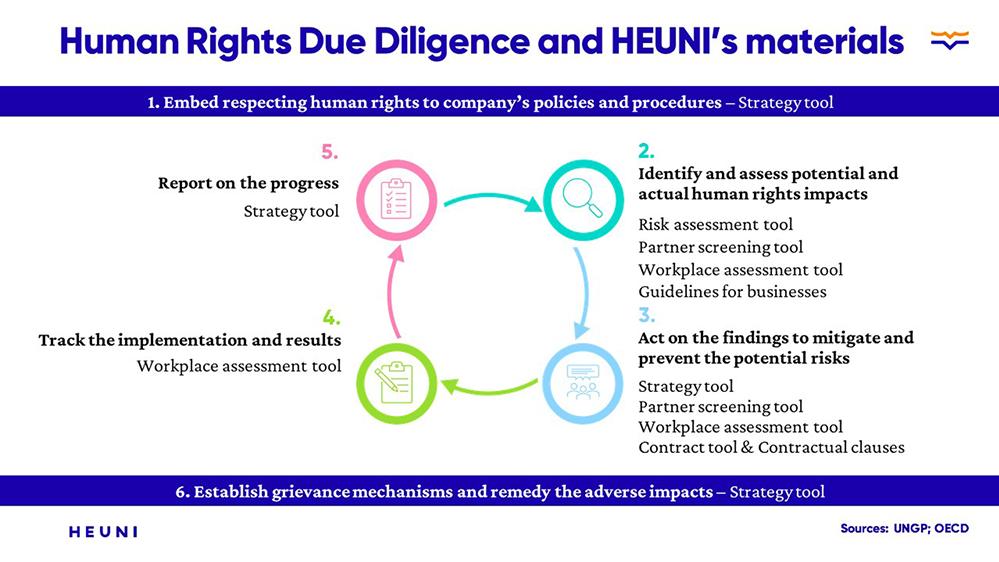
The fresh proposed Directive on Corporate Sustainability Due Diligence (CSDD) by the European Commission is currently the hot topic in business and human rights context. It is also another step towards binding legislation on sustainability, which many countries have already introduced or are in the process of developing. The legislative move is a consequence of the insufficient activities of companies in conducting their responsibility to respect human rights as per the UNGP’s.
Human rights due diligence means the process a company undertakes to assess, mitigate, prevent, and account for its potential and realized negative human rights impacts. The risks include e.g., child labour, forced labour, right to organize, rights of indigenous communities, and many more.
HEUNI’s tools and materials for businesses are concrete guides to implement due diligence on specific risks: prevention of forced labour and labour exploitation. Both occur in Finland, Europe and on a global scale, often out of sight in the companies’ supply chains.
How to ensure that your company is following due diligence?
1st, you must embed the respect for human rights in your operating policies. HEUNI Strategy tool is a comprehensive set of actions to integrate the respect for human rights and the prevention of labour exploitation in your strategies and policies.
2nd, Identify and assess the risks. This is a major part of the due diligence process. HEUNI’s guidelines for businesses include a short list of questions as well as several checklists, which help companies to assess whether they or some of their supply chains or subcontracts have a risk for labour exploitation. Similar risk assessment lists can be found in our Risk assessment tool.
In addition to the checklists, we have a Partner screening tool with several questions, which can be asked from the possible suppliers. The answers should then be analyzed whether they satisfy your sustainability requirements. Further, these checklists and questions also help open your eyes about the risk factors that your suppliers may have.
Also, our Workplace assessment tool can help clarify whether there are risks and negative impacts involved when conducting audits and discussing with the parties involved, i.e., the workers.
3rd, When the risks are understood, they need to be mitigated, prevented and ended. Our Strategy tool gives a holistic overview of the different measures to combat the risk of labour exploitation. The Partner screening tool, or parts of it, can be deployed and made a permanent measure to detect risky suppliers. The workplace assessment tool can be used as a guide in regular audits to analyse the situation of the workers. Moreover, our Contract tool helps ensure that your contracts can be used as a strong measure to prevent exploitation.
4th, As said, due diligence is a continuous process, and the risks need to be assessed and managed regularly. When you have included the prevention of labour exploitation in your strategy, it will be easier to keep the process ongoing. The same checklists and Workplace assessment tools can be used to track whether the process is working or needs revision.
Due diligence also includes the open communication and transparency about the impacts and measures to address those. Similarly, you must have a grievance process in place to remedy the possible negative impacts. To develop these, you can also find tips in the Strategy tool, as well as the different organizations to contact in case of suspicions of labour exploitation or human trafficking.
Want to know more about HEUNI’s tools and work against labour exploitation and human trafficking? Or do you need support in your own due diligence against labour exploitation? Don’t hesitate to contact us! Sustainability specialist, Saara Haapasaari





.png/c63a8f02-cdd3-0bf7-d0aa-8669c4b6dd8b?t=1653905362445&width=640)